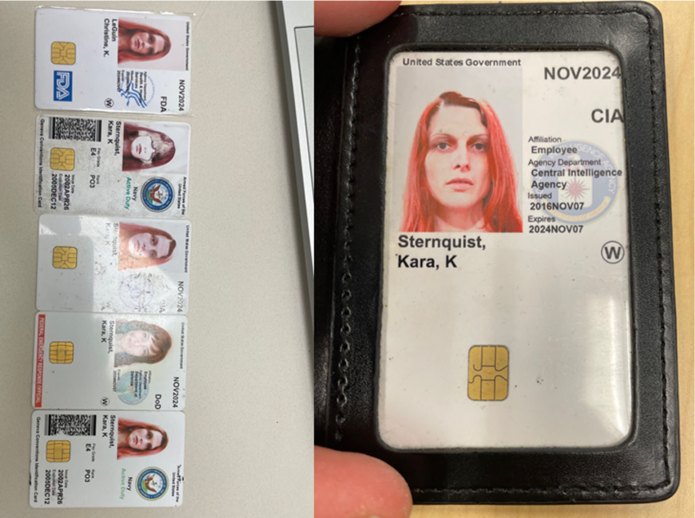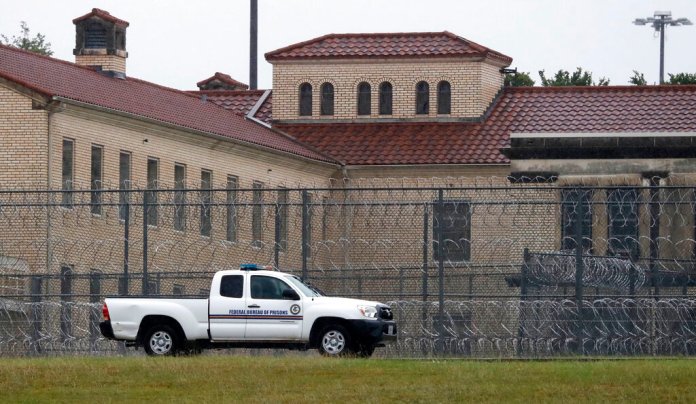A federal judge has granted a temporary restraining order separating transgender inmates from female detainees at a Texas correctional facility for women with special needs, following claims of sexual abuse allegedly committed by some of the biological men housed there.
Judge Sidney A. Fitzwater, a Reagan appointee, ruled last week that any transgender biological man at Federal Medical Center-Carswell, a women’s prison in Fort Worth for female inmates primarily suffering from medical and mental health problems, who shares living quarters with two female plaintiffs in a civil rights case must be housed separately, either “reassigned away” or in placed a “secure, segregated” unit within FMC Carswell.
The men are all also temporarily prohibited from accessing female-designated private spaces, such as showers, restrooms, changing areas, and dormitories, according to a copy of the court order obtained by the Washington Examiner.
Wednesday’s order marks one of the first judicial actions enforcing separation by biological sex, although it represents a narrow, procedural victory in the early stages of litigation over President Donald Trump’s transgender policies. The Trump administration has suffered multiple setbacks in lower courts over efforts to limit the government’s recognition of gender to biological sex. However, it has seen some success at the Supreme Court.
Rhonda Ann Fleming, a longtime litigant fighting the infiltration of men in women’s prisons, is spearheading the lawsuit to get the biological men out of FMC Carswell altogether.
“I can’t sleep at night worrying about my safety and that of disabled women and the mentally ill,” Fleming, 60, told the Washington Examiner.
Fleming lambasted gender ideologues for “testing [transgender policies] out on helpless women in prison,” many of whom were already battered by childhood sexual abuse or domestic violence.
The temporary restraining order, however, only applies to Fleming and her co-complainant, specifically to the areas of the prison they access, but it could be extended to other plaintiffs if they are added.
An evidentiary hearing is scheduled for Dec. 18, when the plaintiffs can call on other witnesses in custody to testify.

Impact on lawfare targeting Trump’s transgender prisoner policy
Monday’s ruling is limited to the men imprisoned at FMC Carswell, with the female inmates named in the lawsuit. It does not affect another case advanced by 19 transgender plaintiffs, all biological males from multiple federal prisons, who are part of an anonymous “Jane Doe” appeal challenging Trump’s executive order on safeguarding women’s spaces.
The presidential directive, which rescinded a slew of Biden-era transgender inclusion policies, in part authorized the removal of biological men from female-only federal detention centers as well as the withdrawal of federal funding for all sex-change services offered behind bars.
In January, a group of male-to-female transgender inmates launched separate lawsuits against the Justice Department to prevent their transfer to men’s prisons, arguing that they would be at risk of sexual assault. Placement in such sex-based housing, they claimed, constitutes “cruel and unusual punishment.”
The biological men won preliminary injunctions keeping them in their current facilities while the case plays out in court, and a surge of transgender complainants joined the now-consolidated case currently before the D.C. Circuit Court of Appeals.
APPEALS COURT PANEL GRILLS DOJ OVER TRUMP ORDER RESTRICTING PRISONS BY BIOLOGICAL SEX
As written, Fitzwater’s court order does not conflict with the Doe v. Bondi lawsuit.
The Doe v. Bondi injunctions forbid the federal government from transferring those male inmates back to men’s prisons. In contrast, Fitzwater’s order requires that the men at FMC Carswell, specifically, be housed separately from the females. If the Doe v. Bondi injunctions were dissolved, then the Federal Bureau of Prisons would be free to move all of the men out of female facilities and jail them by biological sex, pursuant to Trump’s mandate. Until then, the order of injunctive relief in Fleming v. Warden T. Rule shields only the specific women who challenged their conditions at FMC Carswell.
There are over 1,300 male prisoners who identify as transgender in federal lock-ups, according to an internal BOP report. More than half of the transgender-identifying male inmates, 51.3%, are imprisoned for sex offenses. Per BOP statistics, that’s nearly four times the sex-offense rate of the total federal prison population, which is 93.5% male.

“Because the plaintiffs in Doe v. Bondi are anonymous, we do not know which male prisoners it protects, or if they are violent sex offenders,” John Greil, of the law firm Schaerr Jaffe LLP, told the Washington Examiner. Greil is counsel for two additional inmates at FMC Carswell who are looking to join Fleming’s lawsuit as plaintiffs.
According to the government’s brief in Doe v. Bondi, 22 biological men were housed in women’s prisons as of February. So far, 19 transgender prisoners are part of the appeal.
Rosen Bien Galvan & Grunfeld LLP, which ranks in the top tier nationally for appellate practice, is partnered with a consortium of gay rights groups to represent the transgender appellees. When reached for comment, RBGG declined to identify its clients.
The transgender inmates in the case all assumed aliases, such as Sara Doe, Maria Moe, and Donna Jones.
In this type of litigation, activist attorneys strategically redact the name of a prisoner and the location where they are held, explained Elspeth Cypher, a retired Massachusetts Supreme Court judge serving as secretary of the Women’s Liberation Front.
Hiding the plaintiff’s identity, Cypher said in an interview with the Washington Examiner, makes it difficult to find the case in the federal court docket system, which is teeming with similarly titled complaints, generally concerning immigration.
Lawyers for the unnamed transgender inmates said anonymity is necessary “to avoid the grievous harassment, retaliation, and violence—including sexual violence—they would be likely to face from other incarcerated people and corrections officers if their identities were disclosed.”
JUDGE BLOCKS FEDERAL PRISON SYSTEM FROM RELOCATING TRANSGENDER INMATES
WoLF, a women’s rights advocacy organization, filed an eleventh-hour amicus brief in Doe v. Bondi on behalf of incarcerated women across the country, whose voices are typically not heard by the court in these kinds of cases.
Cypher told the Washington Examiner that such pseudonymous cases, set up to protect transgender plaintiffs’ identities, often proceed with no notice for third parties to file briefings. “There’s no way to represent any of the women,” Cypher said.
Cypher urged officials to recognize the harm done to these women, frequently a forgotten population, and the risks they face while stuck in close confinement with men, many of them fully intact.
“We’re going to measure this man’s [gender] dysphoria against the fact that women could be raped while they’re sleeping?” Cypher said. “It’s this acceptance of male feelings as so important over physical safety of the females.”
A pervasive problem of systemic sexual abuse
One of the men at FMC Carswell was allegedly caught preying upon an incapacitated female inmate in the dead of night. Kara Sternquist, formerly “Michael,” is accused by fellow inmates of sexually assaulting a disabled detainee while she was asleep.
Fleming’s complaint alleges that at approximately 2 a.m. on July 19, Sternquist snuck into a restricted section of the prison’s hospital wing and molested a handicapped woman, allegedly telling her, “I’m not trans, I’m bisexual and everything works.”
Tamarisk Trejo Mathews, 53, said she woke up to Sternquist standing over her, speaking sexually with “a big smile on his face,” before grabbing her by the foot, rubbing his hands along her thighs, and yanking her toward him.
Mathews, who has secondary-progressive multiple sclerosis and wears a full-leg orthotic device, recalled screaming at Sternquist, waking the rest of the hospital ward. Afterwards, another inmate alerted the nighttime guard, but he told the women to go back to sleep, Mathews told the Washington Examiner.
That night, however, Sternquist was taken to the Special Housing Unit, an area of isolated confinement that separated Sternquist from the prison’s general population.

The following morning, Mathews said she filed a victim statement because the guard on duty simply reported the incident as Sternquist being “out of bounds,” i.e., in an unauthorized area.
However, within a week and a half, the facility’s administration closed the sexual assault investigation after finding the claims to be “unsubstantiated,” despite eye witnesses and security cameras capturing the incident, Mathews said.
Mathews was prescribed Zoom therapy, and Sternquist was quickly let out of the SHU. Mathews said she was not notified that Sternquist had been released and had to encounter her attacker daily.
Mathews said she felt like that was her “added-on punishment to being here.”
“I have felt dismissed and like I’m in the wrong, [as if] he has more rights here than I do,” she said.
Mathews, who is no longer at FMC Carswell, was eventually moved to a halfway house.
Sternquist is serving a five-year prison term for possessing firearms, fully automatic rifles, that Sternquist had assembled as a previously convicted felon.
In September 2022, investigators seized a cache of silencers and firearms, including a machine gun, in various stages of construction from Sternquist’s New York City apartment. On appeal, Sternquist claimed to be stockpiling weapons for self-defense because Sternquist had allegedly been attacked in an anti-transgender hate crime.
Authorities also discovered in Sternquist’s possession over 50 fraudulent law enforcement badges from more than a dozen different federal agencies, such as the Federal Bureau of Investigation, and counterfeit security-clearance cards depicting Sternquist as an active-duty Navy officer, U.S. Defense Department personnel, and an employee in the Central Intelligence Agency, among many other personas.

Sternquist has an extensive criminal history stretching across several U.S. states, including felony convictions for forging police credentials, manufacturing fake identification documents, identity theft, grand larceny, and carrying a concealed weapon.
While in prison, Sternquist attracted an online following as well as the attention of LGBT-friendly media. The Intercept wrote about Sternquist facing “the terror” of being separated by biology under Trump’s sex-segregated housing rules. Mother Jones published a sympathetic profile of Sternquist detailing how Sternquist has been “misgendered” by correctional officers and allegedly denied medical care.
The fact that Sternquist was found not to have sexually assaulted Mathews is not an isolated episode, inmates say, but is instead reflective of a broader culture of intimidation and predation inside the women’s prison.
Miriam Crystal Herrera, 34, said she has been a victim of voyeurism and sexual harassment at FMC Carswell and has been forced to use the bathroom facilities with many biological men presenting themselves as women.
“For too long, I’ve had to share intimate spaces with them,” Herrera, who is Fleming’s co-plaintiff, told the Washington Examiner. “They can see us shower. I have been stalked in the showers before.”

The women there seldom use the bathroom at night unless it’s an emergency “because we are afraid to have one of them waiting in there,” Herrera explained.
Brenda Leigh Kirk, 52, and Elizabeth Ann Hardin, 68, the two FMC Carswell inmates Greil represents, say that they have personally witnessed and experienced the male prisoners peeking into the showers.
According to their proposed complaint, which asks to intervene in the Fleming-Herrera case, the women at FMC Carswell, including Kirk and Hardin, have had to dress inside the shower stalls or toilet areas, rather than in the open changing space, “to protect an ounce of their privacy from the male gaze.”
Sources also say that at FMC Carswell, the transgender prisoners enjoy continued access to “gender-affirming” accommodations, such as feminine undergarments, while the women are subjected to strip searches in full view of the men, must respect their preferred pronouns, and address them accordingly.
“We are not second-class citizens, but last-class citizens,” Fleming lamented.























